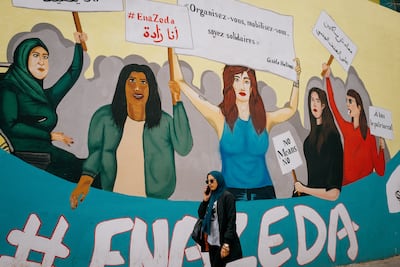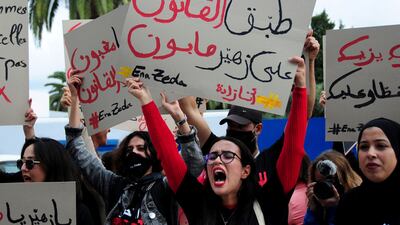In a landmark decision, Tunisian MP Zouhair Makhlouf was on Friday convicted of sexual harassment and sentenced to one year in prison for a 2019 incident that sparked Tunisia's #EnaZeda or #MeToo movement.
The conviction, which follows a two-year struggle by women's rights groups on behalf of the 19-year-old victim who captured video of Makhlouf performing a lewd act outside her girls' high school, is a first for a high-profile case of sexual harassment.
“This conviction represents a triumph for the feminist movement in Tunisia and for all survivors of gender-based violence as it puts an end to a culture of impunity,” the feminist organisation Aswat Nissa, which supported the victim, said after the verdict.
“It is also a victory for all the women who want to file a complaint for sexual harassment” said Naima Chabbouh, the lawyer who represented the plaintiff.
Makhlouf, who had just been elected to Parliament as a member of the Qalb Tounes party at the time of the incident, had previously avoided prosecution due to parliamentary immunity.
President Kais Saied lifted the immunity of all MPs when he unilaterally suspended Parliament in July. Makhlouf was put under house arrest in August.
The verdict is a welcome change for many women in Tunisia, who often feel they are denied justice.
“This case proves justice can prevail,” said Olfa Arfaoui, an activist and researcher focused on women's entrepreneurship.
“It's also a message for other men who think they can be protected because of their power or political position; this is not the case anymore.”

Charges against Makhlouf were brought under Law 58, a landmark piece of anti-sexual violence legislation passed in 2017 that is the first of its kind in the Arab world. The sweeping law criminalises not only physical attacks – including marital rape – but also street harassment.
The law was a major achievement for then-president Beji Caid Essebsi, who took pride in leading a country seen as “the gold standard for women's rights in the Arab world”, said Sarah Yerkes, a senior fellow at the Carnegie Endowment’s Middle East programme.
Progressive laws dating back to the 1950s enabled Tunisian women to select their own spouses, get divorced, access birth control and abortion – often years before their peers in Europe and the US.
While the passing of Law 58 was hailed as a major victory by human rights organisations around the world, the implementation was troubled. Few women knew what they could report, and the process to take an abuser to court was convoluted and demeaning.
“You had this amazing law that was the first in the region to actually have all these protections for women. But then no one bothered to go tell women that they have these rights,” Ms Yerkes said.
The Makhlouf incident sparked outrage among feminist activists, and also stirred up feelings from women around the country who said they were tired of an onslaught of violence and harassment. They took to social media to share their stories of abuse and pain.
A Facebook page, run by four women's rights activists, sprang up as a way to collate all the accounts, and the hashtag #EnaZeda – #metoo in Tunisian Arabic dialect – became a phenomenon that swept the country.
In the two years since, the women have formed a sisterhood of solidarity as they've pushed for implementation of Law 58.
For the first day of Makhlouf's trial, Aswat Nissa hired a coach to take activists to the court in Nabeul, 75 kilometres south-east of Tunis.
En route, a group of around 20 women dressed in red and black practised slogans and chants and made banners that said, “a sexual harasser should not legislate” and “the court must apply the law!".
For Sarah Ben Said, executive director of Aswat Nissa, it was a chance to show how skewed she believed the justice system was against women.
“We wanted to highlight how difficult it is for female victims of violence to have access to the courts.”
Ms Yerkes said the Makhlouf case can be a beacon for others looking to bring similar charges.
“Having such a high-profile case end in a pretty substantial sentence should help some women feel like the justice system can work and could perhaps inspire other victims to come forward.”
But she said this case was difficult to separate from Mr Saied’s actions against MPs – many of whom have been arrested on charges of defamation and tried in front of military courts.
“I do not think we should look at this and expect to see Saied initiate any sort of major push to address the larger issue of sexual harassment and violence against women,” Ms Yerkes said.
Ghaya Ben M'barek contributed reporting


